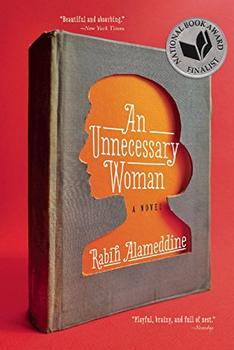Page 1 of 1
There are currently 2 reader reviews for An Unnecessary Woman
Write your own review!
hjeffris
Love this book!
Gorgeous female protagonist, tons of literary and historical references. Uplifting despite "downer" material of senseless war and misogyny of time and place.
 Cloggie Downunder
This beautiful novel has a wonderfully uplifting ending
Cloggie Downunder
This beautiful novel has a wonderfully uplifting ending
An Unnecessary Woman is the fourth novel by Jordanian-born Lebanese author, Rabih Alameddine. Aaliya Sobhi is an elderly divorced woman living alone in an apartment in Beirut. For fifty years, she has translated novels into Arabic, usually starting a new book on the first of January, and packing the finished work away, sealed in a crate, never to be opened again. She is about to select her next book from her lifetime’s collection, when certain events threaten to change her whole way of living. Throughout her narration of current events, Aaliya regularly digresses to describe her past, her childhood, her marriage, her family, her neighbours (“The three witches have been having syrupy coffee together every morning for almost thirty years.”) and her one good friend, Hannah, (“We were two solitudes benefiting from a grace that was continuously reinvigorated in each other’s presence, two solitudes who nourished each other”) against the background of war-torn Beirut, and all her observations are illustrated with quotes from her favourite books. Aaliya’s voice, often self-deprecating, occasionally scathingly critical and full of underlying humour, is strong and clear. This novel is filled with gorgeous prose, much of it marvellously descriptive: “Disappointment hid in the tiny furrows of his forehead, fury in the corners of his mouth.” and “In my morning veins, blood has slowed to the speed of molasses.” Sentiments like “No nostalgia is felt as keenly as nostalgia for things that never existed.” are skilfully illuminated. Alameddine touches on translation and translators (of course), on seeking causality, on the language and style of the Quran and on what influences our memories. This novel is a feast for lovers of literature, even more so for readers who have read the many works mentioned. Alameddine’s love of Beirut and her people is apparent: “Beirut and its denizens are famously and infamously unpredictable. Every day is an adventure. This unsteadiness makes us feel a shudder of excitement, of danger, as well as a deadweight of frustration. The spine tingles momentarily and the heart sinks.” and “A slight breath of air makes the stagnant motes waver; a handful of sunlight kindles them golden and luminous. Apollo, ever the alchemist, still sails his chariot in the skies of Beirut, wielding a philosopher’s stone. Into gold I transmute the air.” Also: “No trace of the psychological scars those battles caused can be found on any Beiruti, however. We suppress trauma so very well. We postpone the unbreathable darkness that weighs us down.” This beautiful novel has a wonderfully uplifting ending.
